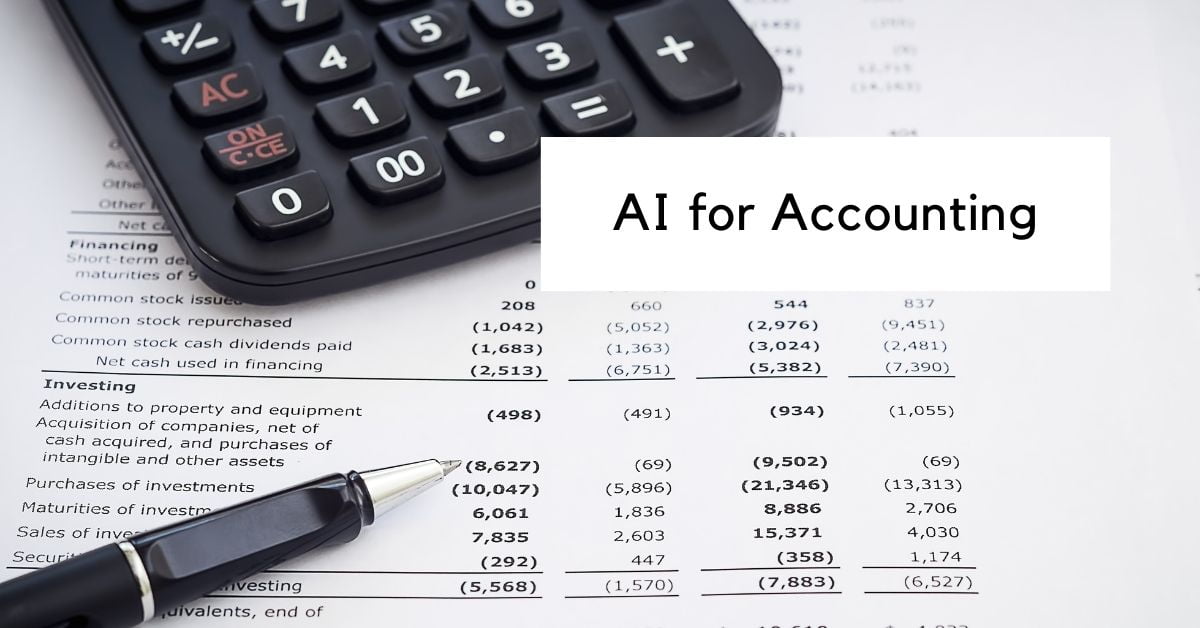Numbers and Algorithms: How AI Transforms the Accounting Profession
Let’s debunk a myth right away: AI is not here to replace accountants; instead, it amplifies their potential and reshapes their role in profound ways. Picture it like this: instead of wasting your time on repetitive, mundane tasks, you have your own personal intern (AI) who does it for you! In this article, we will delve into the possibilities of artificial intelligence in accounting, exploring its remarkable applications, the tangible benefits it brings, and the potential challenges it poses.
Understanding AI in accounting
Artificial intelligence is slowly revolutionizing the accounting industry, bringing significant benefits to professionals and firms. But definitely not replacing accountants, rest assured. By covering manual data entry and taking care of repetitive tasks, AI accounting software can save you time, reduce costs, and provide valuable insights (if you are interested in how it can do just that, check out our articles on foundation models and large language models). In the following years, accounting AI will be essential for staying competitive in the accounting and finance industry.
Current adoption of AI in accounting
AI has gained significant traction in the accounting field, primarily through the use of narrow AI applications (and not just accounting: legal, medical, education, insurance, you name it!). These applications leverage machine learning, natural language processing, and data analytics to streamline accounting processes. By automating repetitive tasks and handling large volumes of data, AI assists accountants in improving productivity and accuracy. Additionally, AI-enabled systems ensure compliance with regulations, enhance auditing processes, and identify potential fraud issues.
Despite the benefits, there are common misconceptions and concerns surrounding AI in accounting. Some fear that AI will replace human accountants entirely, leading to job losses. However, the role of AI is to augment human accountants, enabling them to focus on more strategic and advisory work. The AI that is used in accounting are generative models, meaning that they are only as smart as the data they were trained on (what they were given to read), and able as the question/task you give them to do. Meaning, their performance depends on how you phrase the question (queue prompting and the best prompt engineering courses).
Growth of AI in accounting
According to a recent report, the future growth of AI in accounting is predicted to be substantial. The market size is expected to expand, reaching a value of billions of dollars. The report highlights the segmentation of the market by component (software, service), deployment (on-premise, cloud), and organization size (SMEs, large enterprises). These figures demonstrate the growing recognition of AI’s potential and the increasing integration of AI technologies in the accounting industry, paving the way for a transformative future.
But how will these generative AI accounting software impact the profession? As generative AI technologies like ChatGPT, the most popular and broad model, continue to evolve, they have the potential to revolutionize the accounting profession in profound ways. Just by automating complex spreadsheet processes, ensuring compliance with accounting standards, enhancing technical skills, enabling fraud detection, and reducing costs, generative AI empowers accountants to optimize their workflows and drive value for their organizations.
Application and benefits of AI in accounting
From enhancing efficiency in financial reporting and analysis to risk assessment and fraud detection, financial planning and forecasting, compliance and regulatory compliance, and client engagement and advisory services, AI algorithms and technologies have transformed traditional accounting practices, improving accuracy, speed, and decision-making capabilities.
Enhancing efficiency in financial reporting and analysis
With AI, financial reporting can be expedited, ensuring the timely delivery of information. The use of AI in financial reporting also improves accuracy and reduces human error. AI-powered systems can analyze large volumes of financial data and identify key trends, patterns, and anomalies that may be challenging for humans to spot.
Accounting software like Vic.ai can transform financial data into meaningful narratives and insights, eliminating the need for manual crafting of reports and commentary. Their AI algorithms condense complex financial information into concise and understandable narratives, providing valuable context for understanding a company’s financial performance. Vic.ai also offers AI-powered accounts payable processes, increasing invoice processing productivity by 355%, and providing real-time cost insights and optimization strategies.
AI-powered systems ensure consistency and accuracy in messaging across different reports and reporting periods. These automated systems adhere to predefined rules, standards, and guidelines, mitigating the risk of errors and inconsistencies.
Risk assessment and fraud detection
AI plays a significant role in risk assessment and fraud detection in accounting by utilizing algorithms to analyze financial data, identify anomalies or suspicious patterns, and reduce the risk of fraud while improving auditing processes.
These programs detect fraudulent entries in large databases, use machine learning algorithms to recognize patterns and predict fraudulent activities, and integrate AI with other security systems to provide a comprehensive approach to fraud prevention. AI enhances accuracy, enables real-time monitoring, reduces false positives, increases efficiency, and helps organizations save costs and protect their reputation.
Financial planning and forecasting
AI technology can enhance financial planning and forecasting by leveraging algorithms to analyze historical data, market trends, and economic indicators, resulting in accurate predictions. These AI-powered solutions optimize budgeting, cash flow management, and investment strategies.
For example, intelligent forecasting models utilize AI to account for external factors and key drivers that impact business dynamics. This enables organizations to make more informed and agile decisions, especially during uncertain times. AI forecasting also offers benefits such as increased accuracy, real-time monitoring, reduced false positives, and improved efficiency.
Successful applications of AI in financial planning and forecasting demonstrate its ability to deliver actionable insights and help businesses navigate changing market conditions. Paro.ai provides AI-based adaptive forecasting models that leverage real-time data to accurately project future financial performance for businesses. By incorporating AI into their forecasting models, accounting firms can achieve greater accuracy, adaptability, and strategic decision-making capabilities.
Compliance and regulatory compliance
AI plays a crucial role in ensuring a company has compliance with accounting standards and regulations by using algorithms to analyze financial data and identify potential compliance issues, while also automating compliance processes and reducing compliance-related risks, as demonstrated by successful AI applications like Paro.ai‘s adaptive forecasting models and Compliance.ai‘s regulatory compliance solution.
Compliance.ai is a leading provider of regulatory compliance solutions that leverage AI technology to help businesses navigate complex regulatory landscapes. Their platform offers a modern command center with configurable dashboards, providing real-time insights into potential compliance issues. By monitoring regulatory updates from various sources, Compliance.ai filters and delivers relevant information specific to each user’s specific areas and preferences.
Client engagement and advisory services
By leveraging AI-powered chatbots and virtual assistants, accounting firms can provide personalized financial advice and support to their clients, enhancing the overall client experience. AI algorithms can analyze client data, preferences, and financial goals to offer tailored recommendations and guidance. This not only improves client relationships but also enables accountants to deliver more effective advisory services. With AI automation, routine tasks can be streamlined, allowing accountants to focus on higher-value activities and strategic client interactions.
Successful AI applications in client engagement and advisory services include Fieldguide AI, which automates control tests, drafts requests, and assesses document adequacy, as well as Aiwyn’s Client Engagement Automation solution, which automates engagement letters and client intake processes. These examples demonstrate how AI is transforming client engagement and enabling accountants to provide more personalized and efficient advisory services.
Ethical considerations and challenges of using AI in accounting
Integrating artificial intelligence and AI-based accounting software in accounting brings about several ethical considerations that need to be addressed promptly. One such consideration is data privacy and confidentiality. As AI systems analyze large amounts of sensitive financial data, there is a need to ensure that data is protected and used only for authorized purposes. This involves implementing robust security measures and complying with data protection regulations to maintain the confidentiality of client information.
Another ethical concern is the potential for algorithm bias. AI algorithms are trained on historical data, which may contain biases or discriminatory patterns. AI systems can perpetuate and amplify existing inequalities and discrimination if these biases are not identified and corrected. Transparent and accountable AI systems are essential in the accounting profession. It is necessary to have clear visibility into the decision-making process of AI algorithms and understand how they arrive at their conclusions.
Ethical guidelines and regulations play a significant role in governing artificial intelligence in finance. Organizations should adhere to established principles and frameworks that promote ethical artificial intelligence use. These guidelines emphasize the importance of fairness, transparency, accountability, and human oversight in AI systems.
Integrating artificial intelligence into existing accounting practices and workflows can pose challenges. Resistance to change, lack of expertise in AI technologies, and compatibility issues with legacy systems are some obstacles that organizations may face. It requires careful planning, training, resources, and collaboration between accounting professionals and AI experts to successfully incorporate artificial intelligence into the accounting process.
The future of accounting
The future of accounting and all accounting jobs is being shaped by AI-driven advancements such as robotic process automation, blockchain, and predictive analytics. AI-powered accounting software solutions can improve efficiency, accuracy, and speed in areas like data entry, account reconciliation, invoice management, and auditing.
While there are concerns that AI accounting software will replace accountants in some parts of accounting jobs, the real opportunity for human accountant lies in leveraging AI software to enhance their skills and provide higher-level analysis, advisory, and strategic decision-making, all while using AI for accounting automation. Ongoing research, collaboration, and professional upskilling are crucial for accountants to stay ahead in the rapidly changing accounting landscape.
The transformative impact of AI on the accounting profession, operations, and financial management cannot be ignored, and accountants need to embrace and adapt to these advancements to thrive in the future.
Final thoughts
As the future unfolds more rapidly than we could predict, embracing artificial intelligence in accounting and even AI accountants is not just a choice but a necessity for staying ahead in an evolving industry. The synergy between human intelligence and artificial intelligence will empower accountants to transcend the limitations of mundane tasks and manual tasks, unlock hidden insights into business processes and new technologies, and redefine the very essence of financial management. Welcome to the next chapter of accounting, where innovation knows no bounds.







